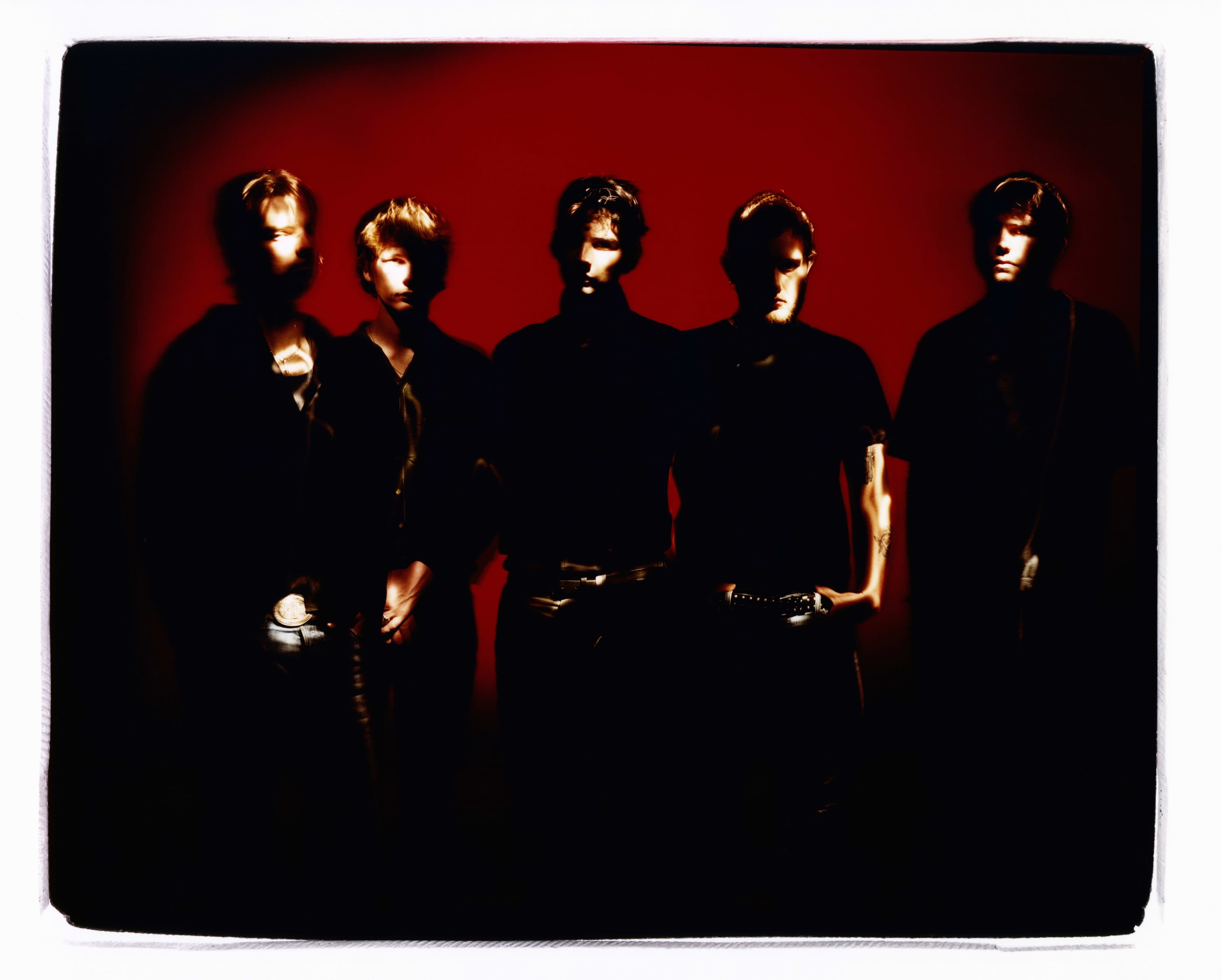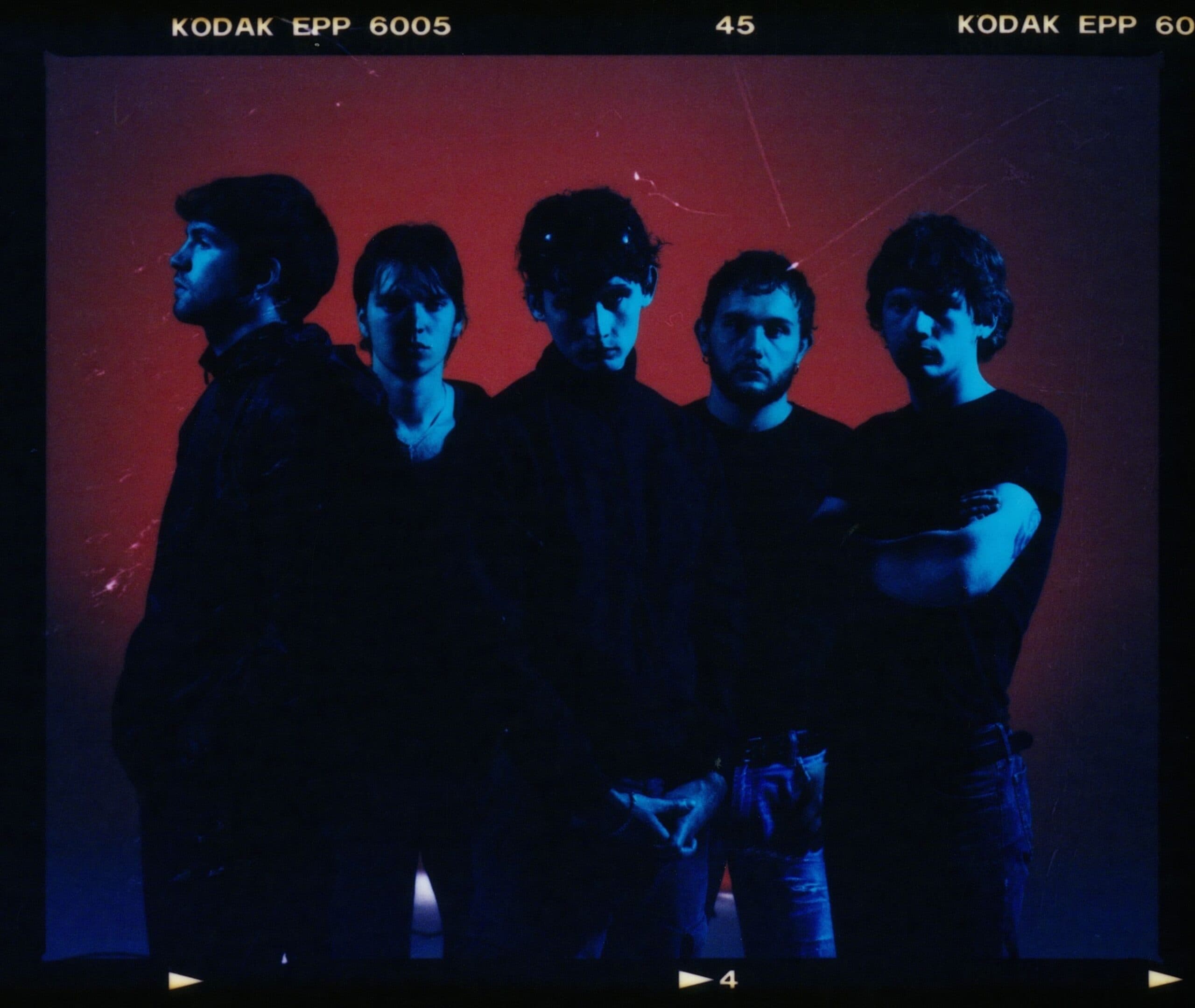By the time Cardinals hit the stage for the final leg of the So Young Tour, Moth Club is heaving. Framed by the gaudy decorations of a former veteran’s society, the Irish band look unassuming and almost solemn until the first chord lands. A quiet intensity falls over the crowd who hang onto every lyric, coloured by the unpolished edge the five-piece has become known for. Formed from friends and family, the grassroots act features lead singer Euan and his brother Finn Manning on accordion, their cousin Darragh Manning on drums and childhood friends Oskar Gudinovic and Aaron Hurley on guitar and bass.
There’s something strangely off-kilter about seeing the Cork musicians perform their catalogue — which is steeped in Catholic imagery — against a backdrop of gilded walls adorned with British military memorabilia. The irony of which isn’t lost on the frontman, who laments that, “There is a portrait of Winston Churchill in our dressing room”. An ill-timed whoop from a drunken fan is sternly silenced by the crowd before the group launch into a preview of their new single “The Burning of Cork”, entitled after the devastating 1920 attack by British Forces. Smouldering with frustration, the track channels the grittier side of their forthcoming album Masquerade which lays bare the turbulence of human emotion, flitting between fury and optimism with startling control.
Unreleased songs are drip-fed to the audience, unveiling a sound more richly textured and unflinchingly confident than the last. It’s not a manicured performance but that’s where its magnetism lies. Manning’s voice tremors over the mournful drawl of the accordion, softening the band’s grungy instrumentals. These imperfect riffs form the backbone of their new album, which preserves an unvarnished rhythm that gives their music its pulse.

The record itself thrives on contradiction, unwilling to be boxed in — much like the artists behind it. Cardinals have little interest in being branded just another ‘Irish band’, sidestepping the ‘plastic paddy’ idea of Irishness flooding pop culture. Instead, their heritage lingers between the lines of their music, not as branding but as a natural thread stitching their work together. Every reference is intentional, drawing from their most cherished authors or melodies they picked up at Trad sessions. This drive for authenticity lies at the core of Masquerade (out 13 February 2026), a debut album that sees the band command a sound that is unequivocally their own — a subject Euan Manning dissects as we sit down to chat.
Do you feel like your upbringing in County Cork has heavily influenced your music career?
We’re not latching onto it as our identity as a group. I feel like it’s being done loads at the moment. It’s an important city to us but we keep that closer to our chest and a bit more personal if we can. We love Cork City and we’ll always come back there when we can and we all still live there. I think you can hear that in the music we’re inspired by, looking to writers like Kevin Barry or Frank O’Connor. That’s all part of who we are but we’re not trying to be super outward with it and flaunt it a lot.
Do you think Irishness is being fetishised at the moment?
Yeah. I don’t think by any means we’ve coined that term or anything, but there is definitely a fetishisation of Irish culture. It’s a shame people want to break it into digestible chunks and not look at the whole picture. Kneecap is a pretty good example of that in terms of an Irish language rap group that stands against colonial values becoming a step too far for people, even though it’s part of our identity as a whole. People are picking and choosing. But it’s cool that Ireland is in the public eye right now and I don’t think any Irish person is taking that for granted. Everyone is still speaking up about problems that are important to our culture and identity. I hope that with repetition of these sort of bite-size chunks of Irish culture, people get to see the full thing eventually.
How did Ireland directly inspire your sound?
I think in terms of our identity as Irish people, there’s just a lot of pride to be taken in the works that have historically come out of our country, whether that’s music or film or anything else. There’s this idea that even if a piece of art is not in the same vein as what you’re doing, you become part of a lineage and it’s a comforting idea.
What inspired you to write “The Burning of Cork”?
There are a lot of different ways you can look at it and I wouldn’t say there is only one, because that might take away from what someone else thinks about it. It’s about colonialism, sure, and it’s about our relationship with Cork City and with Ireland as a broader idea. Musically, we wanted something that felt menacing and hard. We’re into grunge and metal so I think that’s how it was born.
What was the most difficult song to produce on the record?
There was time pressure with “As I Breathe”. I’d written a version of it that I wasn’t happy with. It really irked me. So I went to my parents’ house in the countryside for ten days right before we were due to go to London to record the album. Then when I brought it to the studio, it became this really collaborative thing where everyone was involved. I recorded the vocals in the stairwell of the building with all of these office workers — which was a jarring experience.
What is your song-writing process like?
Usually we come in with lyrics on an acoustic guitar and then it’s pretty much up for grabs. People take turns tearing it apart and building it back up again. As we’ve grown more comfortable with each other it’s become an easier process because people are quicker to shoot stuff down that doesn’t work, rather than tiptoe around confrontation. This has been more collaborative than anything we’ve done before, which is great. That’s how I think a band ought to be, so everyone is involved.
What did embracing imperfection teach you about yourselves as a band?
We wanted to be honest about our work and for it to feel as authentic as we could. The lads in the band are great musicians but we’re all still figuring things out, so we wanted to express that. I wanted to keep that sort of scrappiness and life in the album, which is always without a click track and a mistake or two in the session. We’re not all super hot all the time on the instruments. Improv involves making mistakes first and then figuring the rest out. The songs are still changing. We played them live to figure out whether different variations worked or not and that’s what made it onto the album.

How do you foster sparks of creativity while touring?
It’s so early in our career so we’re hitting so many new places, which can be overwhelming. We feel very inspired on tour but then it’s the hardest place to create and we haven’t broken that barrier yet. You’re sharing a room and a van and you’re wrecked. It’s hard to know what to even eat. We just stop at whatever is off the motorway but then it’s all Starbucks and McDonald’s which we’re trying to boycott. We ate Subway today but then someone said the bread there is classified as cake so… You’re not really spoiled for choice.
Are you finding touring difficult?
Being in the music industry and promoting your debut album, you do kind of feel like you’re clawing at something and sort of scraping your way through the shit to get to where you want to be. That comes out when we play and you get this sort of urgency.
What were the most central pieces of art to the creation of this album?
A piece called “Fristeren” by Norwegian-Irish artist Oda Sønderland is the cover art. Darragh the drummer found the piece. We just thought it was such a striking piece and it struck a chord with us. It totally inspired the rest of our writing of the album. Harry Clark was also a big influence on us. We love his work and it’s so prevalent in Ireland. A song on the album named St Agnes is inspired by one of his pieces we saw in Crawford art gallery in Cork.
What does the Catholic imagery in your music mean to you?
I think it’s subconscious in the way we’ve been exposed to it so much in our youth. In the music, there’s parallels you can draw between devotion and religious devotion and types of love with Jesus or your partner. It could be lots of different things. It’s funny because at one point when we were finishing the songs, Finn asked, What doesn’t make this Christian rock? Are we doing a Christian rock album?
- WriterSarah Kennelly
- Image CreditsSteve Gullick





